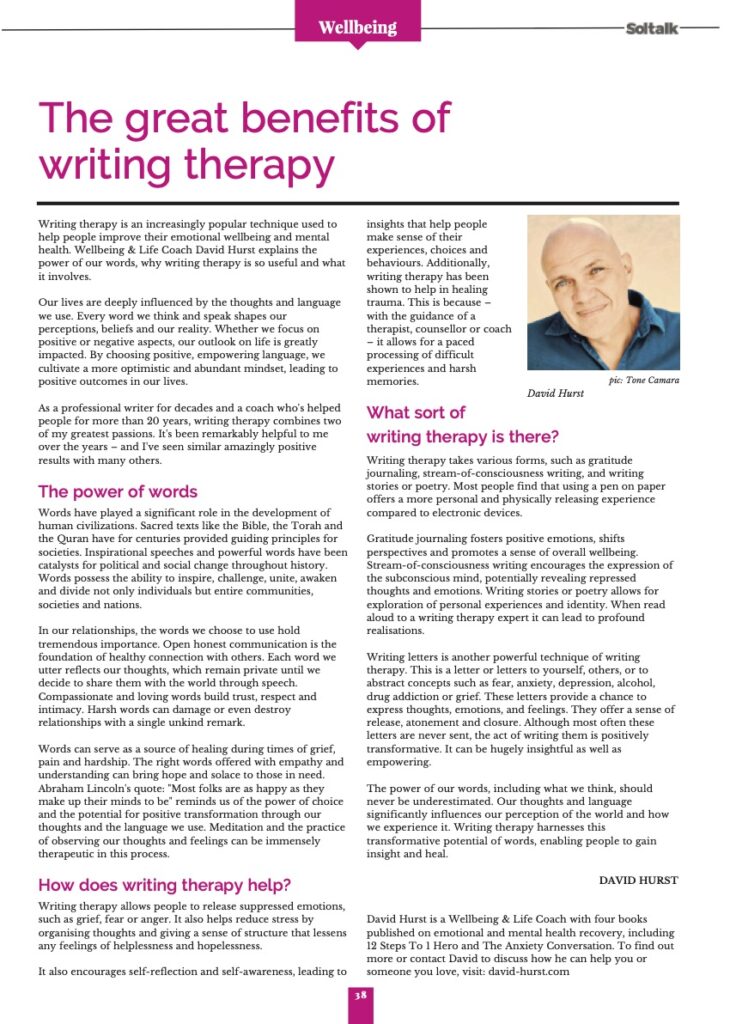The great benefits of writing therapy

Writing therapy is an increasingly popular technique used to help people improve their emotional wellbeing and mental health. But why are our words so powerful, why is writing therapy so useful – and what does it it involve?
Our lives are deeply influenced by the thoughts and language we use. Every word we think and speak shapes our perceptions, beliefs and our reality. Whether we focus on positive or negative aspects, our outlook on life is greatly impacted. By choosing positive, empowering language, we cultivate a more optimistic and abundant mindset, leading to positive outcomes in our lives.
As a professional writer for decades and a coach who’s helped people for more than 20 years, writing therapy combines two of my greatest passions. It’s been remarkably helpful to me over the years – and I’ve seen similar amazingly positive results with many others.
The power of words
Words have played a significant role in the development of human civilizations. Sacred texts like the Bible, the Torah and the Quran have for centuries provided guiding principles for societies. Inspirational speeches and powerful words have been catalysts for political and social change throughout history. Words possess the ability to inspire, challenge, unite, awaken and divide not only individuals but entire communities, societies and nations.
In our relationships, the words we choose to use hold tremendous importance. Open honest communication is the foundation of healthy connection with others. Each word we utter reflects our thoughts, which remain private until we decide to share them with the world through speech. Compassionate and loving words build trust, respect and intimacy. Harsh words can damage or even destroy relationships with a single unkind remark.
Words can serve as a source of healing during times of grief, pain and hardship. The right words offered with empathy and understanding can bring hope and solace to those in need. Abraham Lincoln’s quote: “Most folks are as happy as they make up their minds to be” reminds us of the power of choice and the potential for positive transformation through our thoughts and the language we use. Meditation and the practice of observing our thoughts and feelings can be immensely therapeutic in this process.
How does writing therapy help?
Writing therapy allows people to release suppressed emotions, such as grief, fear or anger. It also helps reduce stress by organising thoughts and giving a sense of structure that lessens any feelings of helplessness and hopelessness.
It also encourages self-reflection and self-awareness, leading to insights that help people make sense of their experiences, choices and behaviours. Additionally, writing therapy has been shown to help in healing trauma. This is because – with the guidance of a therapist, counsellor or coach – it allows for a paced processing of difficult experiences and harsh memories.
What sort of writing therapy is there?
Writing therapy takes various forms, such as gratitude journaling, stream-of-consciousness writing, and writing stories or poetry. Most people find that using a pen on paper offers a more personal and physically releasing experience compared to electronic devices.
Gratitude journaling fosters positive emotions, shifts perspectives and promotes a sense of overall wellbeing. Stream-of-consciousness writing encourages the expression of the subconscious mind, potentially revealing repressed thoughts and emotions. Writing stories or poetry allows for exploration of personal experiences and identity. When read aloud to a writing therapy expert it can lead to profound realisations.
Writing letters is another powerful technique of writing therapy. This is a letter or letters to yourself, others, or to abstract concepts such as fear, anxiety, depression, alcohol, drug addiction or grief. These letters provide a chance to express thoughts, emotions, and feelings. They offer a sense of release, atonement and closure. Although most often these letters are never sent, the act of writing them is positively transformative. It can be hugely insightful as well as empowering.
The power of our words, including what we think, should never be underestimated. Our thoughts and language significantly influences our perception of the world and how we experience it. Writing therapy harnesses this transformative potential of words, enabling people to gain insight and heal.

My latest article for Soltalk magazine.
